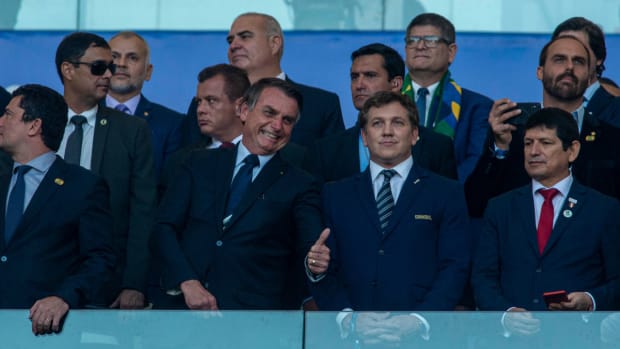The planned co-hosts lost their rights due to COVID-19 surges and political unrest. Now CONMEBOL has gone to a location that features both.
First, the economics. Each competing nation at this year’s Copa América will receive $4 million, with prize money on top of that of up to $10 million for the winner. The last Copa América, in 2019, earned $118 million in revenue. Everything else is set against that. That income and earning potential is why everything else is happening.
This year’s Copa América, postponed from 2020 because of COVID-19, was supposed to be taking place in Colombia and Argentina. First Colombia pulled out because of civil unrest there. Then over the weekend, CONMEBOL, South America's governing body, decided that, with a new wave of COVID-19 raging and an average of more than 30,000 new cases a day, Argentina could no longer safely host the tournament. It has been in a strict lockdown since May 22.
Preparations had already been disrupted by the withdrawal of Qatar and Australia, the two invitees, which meant that rather than two groups of six funneling to the quarterfinals, there would be two groups of five—20 matches to eliminate two sides. With plans in tatters it seemed probable that the tournament would have to be postponed again, probably until 2023, so as not to run into conflict with the 2022 World Cup. But then came Monday’s announcement: Brazil, the 2019 host, would step in. One of the original hosts had withdrawn because COVID-19 was running out of control and the other because of antigovernment protests, and now it will be held in a country that has both. It is hard to understand how CONMEBOL could deem Brazil safe if Argentina is not.

Brazil has suffered more than 462,000 COVID-19 deaths. New cases are running at over 60,000 a day. According to recent data, just over 10% of the population has been fully vaccinated, with around 20% having had one dose. President Jair Bolsonaro has been almost gleefully dismissive of the dangers, refusing to enter lockdown, prompting tens of thousands of protestors to take to the streets of more than 200 cities on Saturday to protest against him. A recent poll suggested 57% would now support his impeachment, as a congressional inquiry examines his response to the crisis with damaging revelations broadcast each day on the news.
Perhaps Bolsonaro believes that a huge public spectacle will distract people from the horror of the pandemic. Perhaps he remembers the outpouring of patriotic pride that always accompanies Brazil at tournaments it hosts, with recent evidence of that at the World Cup in 2014, the Olympics in 2016 and Copa América in 2019. But as Dilma Rousseff found, even hosting a World Cup is no guarantee of anything. Besides, this is the fourth major event in seven years. People are cynical now. They know what the World Cup and Olympic facilities cost Brazil. And that’s before you even get to the logistics of hosting.
Copa América will seemingly begin June 13, but nobody knows where. Venues have been suggested, but barely had Recife been proposed before the governor of Pernambuco insisted he would not allow the tournament to take place in his state. Rio Grande do Sul and Rio Grande do Norte soon followed.
What shape the tournament will take is far from clear. "We are in the middle of the process,” said Bolsonaro’s chief of staff, Luiz Ramos. “But, we will not shy away from a demand that, if it's possible to be done, it could be done."

That suggested the tournament is perhaps not so certain to go ahead as it had seemed. Players have begun to express doubts. Because of preparations for the Qatar World Cup next year, there are seemingly no plans to pause the Brazilian league championship or cup, meaning clubs whose stadiums are selected as hosts would have to find alternative temporary homes.
Former Brazil president Lula, who is likely to stand against Bolsonaro in next year’s election, is looking at whether legal action could halt the plan.
“Is this serious?” he asked. “In the middle of the pandemic, with the arrival of the third wave, with high risk because of the lack of beds and supplies and with the slow vaccination? Amazing.”
There has been backlash also from fans and pundits. The street protests against Bolsonaro will now have the Copa América as a specific focus. If money really is so tight, is this not where FIFA, with its significant reserves, could step in? Can emergency loans not be arranged, or advance payment on World Cup fees be paid? Anything, surely, is better than cobbled-together shambles of a tournament that would seem like a significant risk to the health of those involved.
It is almost impossible to see how Copa América could be staged without chaos. But then, it was almost impossible to imagine Copa América being staged in Brazil at all.
More Soccer Coverage: